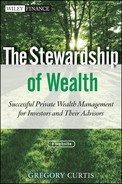Philanthropy
This will be one of the shortest entries in the book for the simple reason that it's none of my business what you do with your money. And if there is a God in heaven I can guarantee you that He or She doesn't give a damn whether you give your money away or not. There are as many philanthropists in hell as in heaven. Henry Clay Frick said to Andrew Carnegie, perhaps the world's greatest philanthropist, when the latter asked to see the former: “I'll see you in hell.”
Family foundations can be a wonderful way to give back to the community and they provide a useful training tool for younger generations in the arts of investing and philanthropy. Young people tend to be a lot more interested in giving money away than in investing it. But if they have to sit through the investment portion of the meeting in order to participate in the grant-making portion, they will gradually internalize the message that grant-making success depends on investment success.
But private foundations are highly regulated beasts and the regulations are getting more strict and becoming more rigorously enforced. In addition, foundations have (by law) heavy spending obligations, making the investment side of things very challenging.
Here are some things to be aware of:
- Keep your eye on the foundation's spending. By law, a private foundation must give away 5 percent of its asset base every year (as a rolling average), and the foundation must also pay a 2 percent excise tax (or pay a 1 percent tax and give the other 1 percent away, on top of the 5 percent). In addition, there are costs that don't count in the 5 percent calculation, and on top of that, many enthusiastic foundation directors end up giving away more than 5 percent on average: Because 5 percent is the minimum, you can only err, if you err, on the upside. In my experience, the average foundation is actually spending about 7 percent per year, and hence they are gradually liquidating themselves in real terms.17
- Avoid inadvertent self-dealing. The penalties for foundation trustees who self-deal are draconian. Most people avoid the obvious self-dealing issues (making a grant to your own child, for example). But here are two examples of self-dealing that trip people up:
- Ethel attends a meeting of a nonprofit group and commits herself to make a $100,000 grant. Ethel has her family foundation make the grant. That's a no-no.
- Frank hires a financial advisor to advise the family, its various trusts, and the family foundation. The foundation represents 20 percent of the overall asset base and pays 20 percent of the overall advisory fee. That's also a no-no. The IRS will take the position that by including the foundation's assets in the fee calculation, the family is paying a lower overall fee (lower in basis points) by taking advantage of the foundation. Result: self-dealing.
- Spend some serious time on your foundation's investment strategy. A high-spending investor, which a private foundation surely is, is caught in a kind of investment catch-22. Because of its high spending, the foundation needs to keep its portfolio highly liquid. But in order to avoid liquidating itself by spending more than it's making (including costs, excise taxes, and inflation), the foundation needs to trade liquidity for return. Balancing these issues isn't child's play.
- Unless your family foundation is very large, consider a donor-advised fund. This will virtually eliminate the regulatory hassle and let you focus on the giving.
There are a lot of good things about the world of philanthropy—see Chapter 2—and I've been directly involved with organized philanthropy since I became president of the Laurel Foundation (one of the Mellon family charities) a quarter-century ago. But there is also a lot wrong with philanthropy, and most of it can be summarized in one word: arrogance. The cure can also be simply summarized: humility.
But humility is in short supply in the charitable world. There is a saying in the business that once you become a foundation president all your jokes become funnier and you will never again have an honest conversation. Arrogance, in other words, is baked into the ecosystem of organized philanthropy at the level of its DNA.
In recent years there has been a movement afoot to acknowledge foundation failures, the thought being that confession is good for the soul and that failure is a learning experience. Well, maybe so, but recall that when in his arrogance Icarus flew too near the sun, it was Icarus himself who paid the ultimate price. When a foundation initiative fails—and especially when a very large and powerful foundation's initiatives fail—the price isn't paid by the foundation but by the “target population,” and that price can always be reckoned in turmoil and bitterness and sometimes in squandered lives. If you shot most nonprofit executives up with truth serum, what they would say about most charitable giving would fry your hair.
Still and all, giving your money away is good for you. More important, it's good for your kids to watch you do it. And even more important than either of those things, it's good for you, for your kids, and for the community in general to see you roll up your sleeves and get your hands dirty working on something you actually care deeply about.
I'm assuming, of course, that you are giving your money away sensibly, not just pouring it down some rat hole in the hope that it will get you in front of the right people or on the right boards.
By the way, “sensibly” means nothing more (nor less!) than funding something you feel passionate about. It might take you a while to find this topic—it might take you a lifetime—but once you find it, you'll know it. It's the only way most of us have to walk with the angels.
